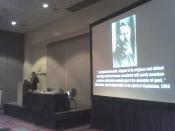Karl Marx believed in the theory of Dialectical Materialism. The "commodities" such as the machines, technology and workers are the capitalism's mean of production. Each piece has a place in the structure. The workers do not generally own the machines that he or she works on nor does he/she create the technology. He/she are merely parts or cogs in the great workings of the structure.
This concept is very instantly recognizable in Chapter 8 of Eric Schlosser's Fast Food Nation. Chapter 8 deals with the commodities and conditions within beef slaughterhouses and the meat packing industry. The industry uses the fact that many of their workers are illegal to employ people "at will". This means workers can be fired without warning for any reason. These slaughterhouse workers have therefore become "equipment" no different from the machinery with no control over the means of production. They are forced to sell their labor power just to survive to those who control these means.
The workers' "human labor" has a certain exchange value. However, it is not a fair and equitable exchange in the capitalist society. The workers tend to be exploited out of his/her fair wage for work done to boost profits.
The abuse of workers at these slaughterhouses, who are mostly recent immigrants, and the over demanding disassembly line has lead to dangers to horrific to discount. Starting with page 176 and throughout the rest of the chapter, there are descriptions of the gross mistreatment of the workers. Most of the injuries that the workers sustain are ignored or discounted by the management and owners. In fact, the workers are discouraged from reporting injuries for fear of losing the job. "If the worker agrees to not report an injury, a supervisor will usually shift her/him to an easier job..., providing...


